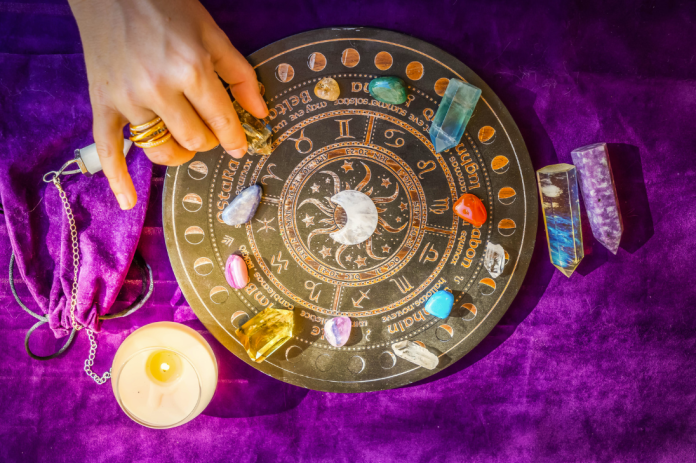Are you familiar with astrology, and do you know where the stars and the planets are and how they move around the solar system? If you are, then you have the basic ideas of astrology. Astrology affects how people behave but did you know there are different types of astrology?
In today’s world, people practice more than 10 different kinds of astrology, and these do not even include the ones from historical traditions.
Most people and cultures have used some kind of astrology, from the Aztecs to the Incas. No matter what kind of astrology you believe in, there are three that are major, including:
- Western or Tropical
- Vedic
- Chinese
Each of these astrology types can be used when you do a psychic reading.
Western or Tropical
Western and Chinese astrology are very similar because they are based on 12 different signs and symbols with different meanings and when you were born. The practices are different, though, and here are some practices of Western astrology:
- Discovered by the Greeks and Babylonians more than 2,000 years ago.
- Believed that the Earth and the Sun are most important.
- Uses the Tropical Zodiac because of how close the sun is to the earth.
- Uses the Tropic of Cancer and the Tropic of Capricorn
- There are 12 signs, including Scorpion, Sea-Goat, Water Bearer, Fish, Ram, Bull, Twins, Grab, Virgin, Scales, Lion, and Centaur.
- The 12 signs are for each month of the year, and there are different constellations that are named after these signs.
- They believe that people born in the same months are similar.
- The calendar looks like a regular calendar.
- The zodiac stars are known as sun signs.
- The Vernal Equinox happens in the Spring.
- The planets are used in Western Astrology and help motivate people’s actions.
- The system uses 2 moon nodes.
- There are four elements in each astrological sign that works with the earth, fire, air, and water.
Chinese Astrology
The Chinese zodiac is seen at most Chinese restaurants, which is how their astrological system works. For example, if you were born in 1978, you are a horse. Here are some other things about Chinese astrology:
- There are 12 signs, including Pig, Dragon, Ox, Rat, Rabbit, Tiger, Snake, Horse, Goat, Rooster, Dog, and Pig
- The 12 signs are believed to be created by God because there was a race.
- Each zodiac animal has a specific month, and some are related to 2 out of the 24 terms of time.
- People that are born in certain years have similar traits.
- The Chinese use three keys to know your sign, including your birth hour, month, and date.
- They use the lunar phase of the time you were born.
- There are four moon phases, including the full moon, waxing moon, waning moon, and new moon.
- Each phase of the moon can determine your personality.
- This has five elements: fire, earth, metal, water, and wood.
- Animals are on 12-year cycles, and the zodiac cycle lasts 60 years.
Vedic Astrology
Vedic astrology is also called Jyoti’s and means “science of light.” This is one of the oldest kinds of astrology and comes from around 2,000 BCE. This has a reputation for being spiritual and being able to make predictions from these practices.
- Uses modern-day names.
- Known as Hindu or Indian astrology.
- Planets are part of the karmic soul.
- Karma is the central theme.
- Karma can affect you negatively or positively.
- Incorporates medicine, gemstones, yoga, and more.
- Uses the Sidereal zodiac or the stars.
- Vedic practices do not believe there is a relationship between the earth and the sun.
- Uses planetary periods.
- Uses to make predictions.
- Can be used for psychic readings to determine a person’s career, life, health, and love.
Astrology practices are fun and interesting to study. Which version do you prefer, and which would you like to learn more about? Expand your horizons by learning about each form, starting with those shared here.


The explanation of the different types of astrology is quite thorough. The article is well-organized and provides a clear comparison between Western, Chinese, and Vedic astrology. It’s a good starting point for anyone interested in delving into astrology.
The article does a good job of summarizing the key characteristics of each astrology type. I appreciate the inclusion of historical context and cultural significance.
I agree. The historical context really helps in understanding how these astrological systems evolved and their importance in different cultures.
It’s fascinating to learn about the distinctions between Western, Chinese, and Vedic astrology. I was unaware of the historical roots and the different elements each system uses. This has definitely piqued my interest in exploring more about these traditions.
I’ve always been curious about astrology but didn’t realize there were so many types. The differences between the systems are more nuanced than I thought, and it’s enlightening to see how each one assigns meaning to different celestial events.
The article provides a comprehensive overview of the three major types of astrology. It is interesting to see how different cultures interpret celestial movements in unique ways. I am particularly intrigued by the Vedic astrology’s emphasis on karma and spiritual elements.